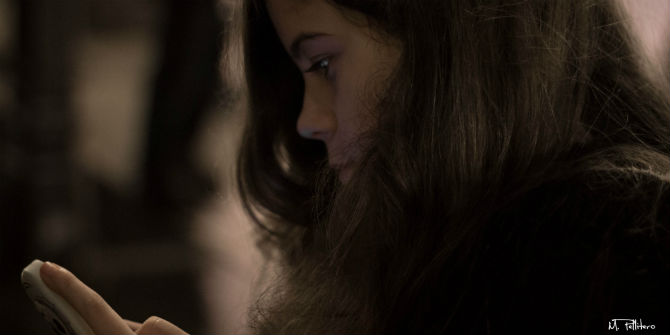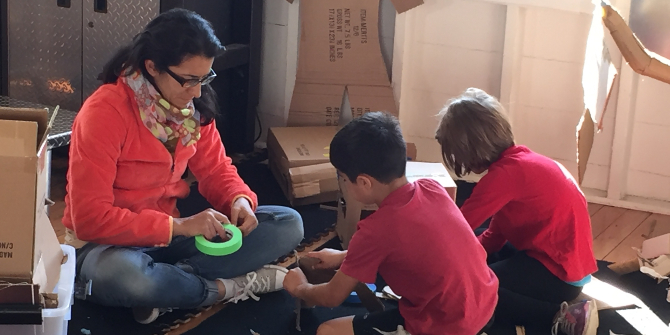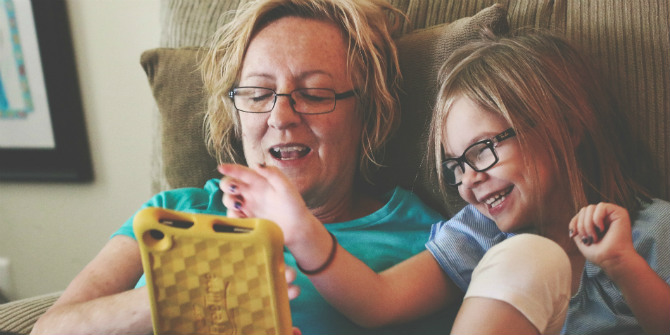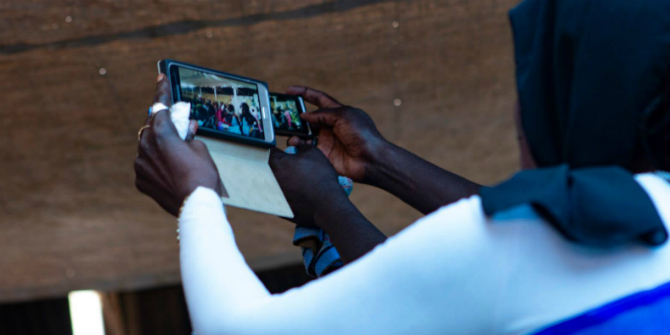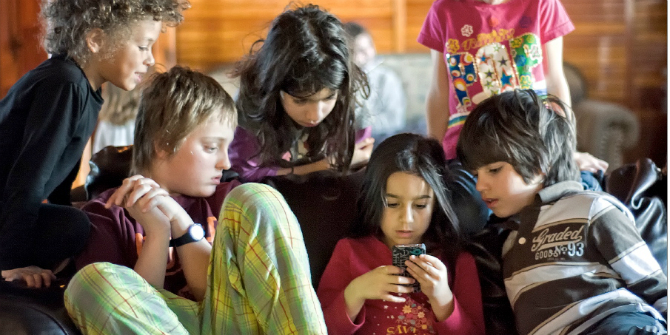 Credit: C. Robillard, CC BY-NC 2.0
Credit: C. Robillard, CC BY-NC 2.0
 While barely half the population in Brazil use the internet, almost three-quarters of children aged 10–15 do. Camila Garroux, information analyst at CETIC.br (Regional Center for the Development of Information Society), explores who should be responsible for children’s internet use – schools or parents – and how. Camila’s work in Brazil is an affiliated country project of the EU Kids Online network.
While barely half the population in Brazil use the internet, almost three-quarters of children aged 10–15 do. Camila Garroux, information analyst at CETIC.br (Regional Center for the Development of Information Society), explores who should be responsible for children’s internet use – schools or parents – and how. Camila’s work in Brazil is an affiliated country project of the EU Kids Online network.
“I do not allow my daughter to watch videos alone, because she can click on a link and see something inappropriate for her.” (Parent-Kids Online Brazil Survey, 2013).¹ Just as anything that concerns children’s education, there are no manuals or universal rules for parents on dealing with the digital environment.
New family dynamics
As the internet is increasingly present in children’s daily lives, the digital environment is creating new dynamics of family relationships. In Brazil, the largest country in South America, the adult proportion of internet users barely reached half the population, reaching 51% in 2013, while 75% of children aged 10-15 are internet users, much higher than the average population. It is therefore important to consider the opportunities brought about by digital technologies for young users. The internet provides a space for learning and self-expression for children, but, as in the offline life, it also brings potential risks, such as sexual harassment, bullying and exposure to pornography.
Ensuring safety
Assuming that children are increasingly connected, how do we deal with their inclusion in a digital context? How can we ensure their safe participation online? Parents certainly have a key role in this. Data show that there is growing access to the internet from mobile devices in Brazil. In 2013, 53% of internet users aged 9-17 accessed the internet through mobile phones, 42% via notebook and 16% through tablets, a significant increase compared with the previous year. Furthermore, more than half (57%) used the internet in private locations, such as their own bedroom, while in the previous year this percentage was only 26%.
The increasing internet usage by children in private spaces raises the importance of adopting other mediation strategies to ensure their safe internet use. Because of this new trend of children accessing the internet when it is more difficult to have adult mediation, parents need to think of ways for dealing with inappropriate content that doesn’t just involve them being next to their children while they are online.
Parental controls
But what about parental controls or other means of keeping track of the websites children visit? While these tools can be handy, keep in mind that almost half of Brazilian parents (49%) are not internet users, and this possibly relates too to their low adoption of technical tools. Only 26% use content filters and 25% track the sites their children visit:
“I don’t help my child to look for things on the internet. He is the one who helps me do that!” (Parent-Kids Online Brazil Survey, 2013).²
Considering the Brazilian context, a pedagogical approach becomes more important as a mediation strategy than the use of technical tools alone. Guiding children towards an ethical and safe use of the internet should not require any technical knowledge – creating a code of conduct should be just like setting rules for having fun in the playground, or walking in the park.
The role of media
Parents must therefore become better informed about safe internet use. While most rely on traditional media as a main source of information (42%), this highlights how media could play a social role in sharing information on safe use, by presenting and disseminating resources available to deal with online risks, for example, such as the Helpline, a free guidance channel for child victims of violence on the internet (an initiative of SaferNet, a Brazilian NGO specialising in safe and responsible use of the internet).
The role of schools
However, when asked about desired sources of information on safe internet use, the school emerges as the most mentioned source by Brazilian parents. Schools have an important role in developing children’s critical sense, and formal education must get closer to students’ daily lives by discussing relevant topics, such as safe internet use and the digital context. Teachers could explain about inappropriate sites, and present other interesting and enriching alternatives for learning – it is often up to them to offer different research options to children.
The need for closer dialogue
The main issue for guidance on mediation on safe internet use by children is promoting closer dialogue between children, parents and teachers. Experts tend to recommend that all adults should work together to teach children how to use the internet safely, because of the difficulty in setting clear boundaries between the duties of educators and families on this topic.
Although parents play a fundamental role, educators also have a social responsibility in order to incorporate this subject into their scope of action, ensuring safe access to online opportunities for all young people.
NOTES:
¹ Cognitive interview conducted in 2014 with parents in order to assess the questionnaire, identifying the effectiveness in obtaining the necessary information.
² Cognitive interview conducted in 2014 with parents in order to assess the questionnaire, identifying the effectiveness in obtaining the necessary information.


